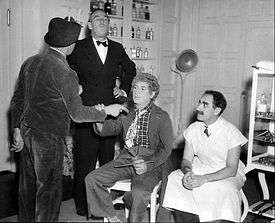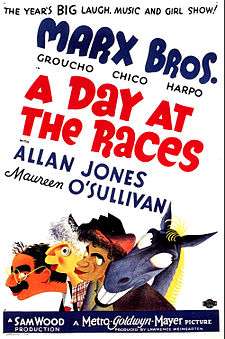A Day at the Races (film)
| A Day at the Races | |
|---|---|
|
theatrical release poster | |
| Directed by | Sam Wood |
| Produced by |
Sam Wood Irving Thalberg (uncredited) Lawrence Weingarten (uncredited) |
| Written by |
Robert Pirosh George Seaton George Oppenheimer |
| Screenplay by |
Al Boasberg (uncredited) Leon Gordon (uncredited) George S. Kaufman Carey Wilson |
| Starring |
Groucho Marx Harpo Marx Chico Marx Allan Jones Maureen O'Sullivan Margaret Dumont |
| Music by |
Walter Jermann Bronislau Kaper Franz Waxman |
| Cinematography | Joseph Ruttenberg |
| Edited by | Frank E. Hull |
| Distributed by | Metro-Goldwyn-Mayer |
Release dates |
|
Running time | 109 minutes |
| Country | United States |
| Language | English |
A Day at the Races (1937) is the seventh film starring the three Marx Brothers, with Margaret Dumont, Allan Jones, and Maureen O'Sullivan. Like their previous Metro-Goldwyn-Mayer feature A Night at the Opera, this film was a major hit.[1]
Plot
Hugo Z. Hackenbush (Groucho Marx) is a veterinarian who is hired as chief of staff for the Standish Sanitarium, owned by Judy Standish (Maureen O'Sullivan), at the insistence of her most important patient, the wealthy Mrs. Emily Upjohn, (Margaret Dumont), who insists on being treated only by Dr. Hackenbush. The Sanitarium has fallen on hard times, and banker J.D. Morgan (Douglas Dumbrille) is attempting to gain control of the sanitarium in order to convert the building into a casino. Judy hopes that Mrs. Upjohn will make a large donation and prevent that from happening.
Meanwhile, Judy's beau, singer Gil Stewart (Allan Jones), who performs in Morgan's nightclub, has spent his life's savings on a racehorse named Hi-Hat. His hope is that the horse, which he purchased from Morgan, will win a big race and the money will allow Judy to save the sanitarium. Unfortunately, he now has no money to pay for the horse's feed, and he and Tony (Chico Marx), who works for the sanitarium, and Stuffy (Harpo Marx), Hi-Hat's jockey, have to resort to trickery to fend off the Sheriff (Robert Middlemass). Tony raises some money by scamming Hackenbush in the "Tutsi Fruitsy Ice Cream" scene, in which Tony gives Hackenbush a tip on a horse, but all in code, so that Hackenbush has to buy book after book from Tony to decipher the code.
At the Sanitarium, Judy's business manager, Whitmore (Leonard Ceeley) – who is also Morgan's stooge – suspects Hackenbush is a fraud and attempts to expose him and rattle Mrs. Upjohn's faith in him by having her discover him in a compromising situation with a blonde floozie (Esther Muir). Hackenbush is saved by Stuffy and Tony, who pose as house detectives and then as paperhangers, who first paste the vamp to the wall behind layers of wallpaper and then hide her under the sofa cushions. Next, Whitmore brings in the eminent Dr. Steinberg (Sig Ruman) from Vienna, whom he hopes will expose Hackenbush as a quack.
Hackenbush, Tony, Stuffy and Gil hide out in Hi-Hat's stable, where Judy soon joins them. Whitmore finally exposes Hackenbush as a horse doctor and Morgan is about to have them arrested when Hi-Hat hears Morgan's voice and bolts, jumping several obstacles in the way. Gil realizes that Hi-Hat is a jumper, and enters him into the upcoming steeplechase race. Morgan, who witnessed Hi-Hat's jumping ability, tries to prevent him from being entered in the race. After some difficulty getting past Morgan and the Sheriff, the race begins. Knowing that Hi-Hat is afraid of Morgan, everyone works to make Hi-Hat aware of his presence before reaching the fence.[2][3][4] On the last lap, Hi-Hat and Morgan's horse wipe out; when they reach the finish line, it appears that Morgan's horse has won. Stuffy realizes that the mud-covered horses were switched after the accident, and Morgan's jockey was riding Hi-Hat in the finish, thus making Hi-Hat the winner.
Cast
|
|
Cast notes
- In My Life with Groucho: A Son's Eye View, Arthur Marx relates that in his latter years Groucho increasingly referred to himself by the name Hackenbush.[6]
Production

The screenplay went through numerous outlines, treatments and drafts before arriving at its final version. The majority of the screenplay was written by Al Boasberg, but due to a bitter spat with MGM, he chose not to be given any credit for his work. As they had with A Night At The Opera, the Brothers honed the comic material during a pre-production Vaudeville tour.
Groucho's character was originally named "Quackenbush" but was changed to "Hackenbush" over fear of lawsuits by several real Dr. Quackenbushes.
During production, Irving Thalberg, who had brought the Marx Brothers to MGM, died suddenly of pneumonia at age 37. After Thalberg's death the studio never gave the proper care to the Marx Brothers, and their three later MGM films are considered to be far inferior than the first two as a result.[7]
The original release of A Day at the Races presented the water carnival sequence in light brown sepia and the ballet scene with a blue tint.[8]
Music
The songs in the film, by Bronislaw Kaper, Walter Jurmann, and Gus Kahn, are "On Blue Venetian Waters", "Tomorrow Is Another Day," and "All God's Chillun Got Rhythm" (which features Ivie Anderson from Duke Ellington's orchestra). Two other songs were filmed, but cut because it was felt that the film was too long. One, "Dr. Hackenbush", was sung by Groucho about what a great doctor he is ("No matter what I treat them for they die from something else"). The other, "A Message From The Man In The Moon", sung by Allan Jones, is missing from the film but the melody is heard during the opening titles, some incidental music, and is "reprised" by Groucho during the final scene. The DVD release includes a recently rediscovered audio recording of the song, performed by Allan Jones.
The film also features a lindy hop dance sequence set to the tune of "All God's Chillun Got Rhythm", and featuring Whitey's Lindy Hoppers, including Willamae Ricker, Snookie Beasley, Ella Gibson, George Greenidge, Dot Miller, Johnny Innis, Norma Miller and Leon James.[9] The dance sequence was nominated for the short-lived Academy Award for Best Dance Direction.
Musical numbers
- "On Blue Venetian Waters"
- "Tomorrow Is Another Day"
- "All God's Chillun Got Rhythm"
- "Nobody Knows the Trouble I've Seen"
- "A Message from the Man in the Moon"
- "Cosi Cosa" (instrumental version at the race track)
Reception
Contemporary reviews from critics continued to be positive for the Marx Brothers through their seventh film. John T. McManus of The New York Times called it "comparatively bad Marx," although still deserving of "a much better than passing grade" because "any Marx brothers motion picture is an improvement upon almost any other sustained screen slapstick."[10] Variety declared, "Surefire film fun and up to the usual parity of the madcap Marxes."[11] Harrison's Reports wrote, "Very good! The Marx Brothers are at their best and funniest here."[12] John Mosher of The New Yorker was also positive, writing that "Groucho, Harpo, and Chico are in full blast again," and the film "reaches a fever pitch even beyond earlier records."[13] The Chicago Tribune called it a "ridiculous farce, plummed with unique gags, laugh provoking situations, fast action ... The finale sends audiences away grinning and happy."[14]
The film is recognized by American Film Institute in these lists:
- 2000: AFI's 100 Years...100 Laughs – #59[15]
- 2005: AFI's 100 Years...100 Movie Quotes:
- Flo Marlowe: "Oh, hold me closer! Closer! Closer!"
- Dr. Hugo Z. Hackenbush: "If I hold you any closer, I'll be in back of you."
- - Nominated[16]
References
Notes
- ↑ Giddins, Gary (June 18, 2000). "There Ain't No Sanity Claus". The New York Times. Retrieved March 3, 2010.
- ↑ Tinee, Mae (July 3, 1937). "Marx Brothers Go Fast Pace in 'Day at Races'". Chicago Daily Tribune. p. 9. Retrieved March 3, 2010.
- ↑ Schallert, Edwin (June 17, 1937). "Marx Brothers Run Riot In "A Day At The Races"". Los Angeles Times. p. A15. Retrieved March 3, 2010.
- ↑ "Full synopsis" at TCM.com
- ↑ Bill Crow From Birdland to Broadway:Scenes from a Jazz Life, New York: Oxford University Press, 1992 [1993], p.24
- ↑ Marx, Arthur (June 1991). My Life with Groucho: A Son's Eye View. Robson Book Ltd. ISBN 978-0-86051-494-7.
- ↑ Thames, Stephanie. "The Big Store" on TCM.com
- ↑ "A Day at the Races". Turner Classic Movies. Retrieved August 27, 2016.
- ↑ Manning, Frankie and Millman, Cynthia. Frankie Manning: Ambassador of Lindy Hop Philadelphia: Temple University Press, 2007
- ↑ The New York Times Film Reviews, Volume 2: 1932-1938. The New York Times & Arno Press. 1970. p. 1402.
- ↑ "Film Reviews". Variety. New York: Variety, Inc.: 12 June 23, 1937.
- ↑ "A Day at the Races". Harrison's Reports. New York: Harrison's Reports, Inc.: 103 June 26, 1937.
- ↑ Mosher, John (June 19, 1937). "The Current Cinema". The New Yorker. New York: F-R Publishing Corp.: 79.
- ↑ "Marx Brothers Go Fast Pace in 'Day at the Races'". Chicago Daily Tribune. Chicago: Chicago Daily Tribune: 9. July 3, 1937.
- ↑ "AFI's 100 Years...100 Laughs" (PDF). American Film Institute. Retrieved 2016-08-08.
- ↑ "AFI's 100 Years...100 Movie Quotes Nominees" (PDF). Retrieved 2016-08-08.
Further reading
- Buxbaum, Elisabeth: Veronika, der Lenz ist da. Walter Jurmann – Ein Musiker zwischen den Welten und Zeiten. Mit einem Werkverzeichnis von Alexander Sieghardt. Edition Steinbauer, Wien 2006, ISBN 3-902494-18-2
External links
| Wikiquote has quotations related to: A Day at the Races (film) |
| Wikimedia Commons has media related to A Day at the Races. |
- A Day at the Races at the Internet Movie Database
- A Day at the Races at AllMovie
- A Day at the Races at the TCM Movie Database
- A Day at the Races at the American Film Institute Catalog
- Full description of A Day at the Races from Filmsite.org
